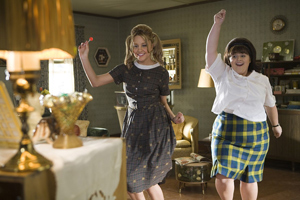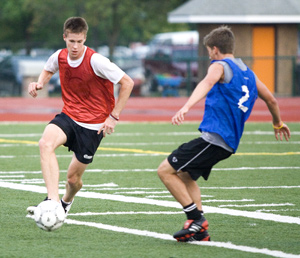A bevy of fresh faces have just arrived on campus eager to embark on their journeys towards degrees. I invite all Wash. U. students to add a different (yet, also impressive) credential to their resumes. My indie-music education began several years ago with days spent perusing local CD shops, evenings spent in small, smoky underground venues and nights spent pouring over MySpace and last.fm. Now, I’m ready to play professor. Pay attention, study hard and research thoroughly, my students, because indie music is part of the college repertoire. Earning an indie cred is hard work so I’ve prepared a study guide to ease the load. Here’s five little-known bands with which any budding indie-ologist should be familiar:
Dungen
Dungen’s sound is the brainchild of Gustav Ejste. The group performs as a five-piece, but Ejste is responsible for playing most of the instruments and vocals on recordings. Dungen evokes a psychedelic, classic rock sound. Although the classic rock genre usually calls to mind British and American greats, Dungen is Swedish. Never mind that the lyrics aren’t in English; the music is incredibly melodic, complicated and captivating. The foreign lyrics make for a fantastical sensation and listening to Dungen is a trip.
 |
Dungen’s most recent albums are “Ta Det Lugnt” (2004) and “Tio Bitar” (2007).
Tracks to download: “Panda,” “Mon Amour,” “Du e fâ€r fin fâ€r mig,” and “Gor Det Nu” |
Grizzly Bear
Grizzly Bear’s experimental, folksy sound is evocative of Iron and Wine with slightly more backbeat. There are winding journeys of lengthy guitar strums, piano keys and even clarinet. The band masterfully combines electronic instruments with traditional. The sound of Grizzly Bear can be incredibly calming; they are a great artist to listen to while lounging in bed, reading a book or studying.
 |
This Brooklyn quartet has released three albums on Kanine Records: “Horn of Plenty” (2004), “Horn of Plenty (The Remixes)” (2005) and “Sorry for the Delay” (2006). They have also released “Yellow House” (2006) on Warp Records.
Tracks to download: “Don’t Ask,” “Fix It,” “A Good Place,” “A Sure Thing,” “Little Brother,” “Knife” |
Man Man
Crazy, brilliant and playful all at the same time-Man Man is nearly indescribable. They are a three-ring circus captivated in sound. This band incorporates a myriad of instruments into their funky sound. Nonsense lyrics and lively beats overlapped by xylophones, guitars and synth makes for something ridiculously original. Man Man is highly regarded for their outrageous live shows. They decorate their instruments with knick-knacks and feathers and the whole lot dresses in a matching monochromatic scheme with face-paint.
 |
Man Man has released two albums: “The Man in a Blue Turban with a Face” (2004) and “Six Demon Bag” (2006).
Tracks to download: “Engrish Bwudd,” “Black Mission Goggles,” “Van Helsing Boombox” |
Mono
For an entirely instrumental band, Mono’s post-rock sound is remarkably captivating. Their music is mellow and haunting. This Tokyo-based band features layers of guitar work accompanied by drums and the occasional piano key. Their songs are very long, somewhat like a modern-day orchestra. It’s a perfect lullaby for adult ears.
 |
Mono has released four albums: “Under the Pipal Tree” (2001), “One Step More and You Die” (2003), “Walking Cloud and Deep Red Sky, Flag Fluttered and the Sun Shined” (2004) and “You Are There” (2006).
Songs to Download: “The Flames Beyond Cold Mountain,” “Com(?),” “A Thousand Paper Cranes” |
Voxtrot
Voxtrot’s infectious pop-rock beats are uplifting, captivating and soothing all at once. Vocalist Ramesh Srivastava’s sweet voice speed-sings yet articulates every lyric perfectly, demanding attention for the words. Layers of guitar and bass compliment the drum-driven music.
 |
The Austin band only has one full length album, “Voxtrot” (2007) and three self-released EPs. Every one is worth owning.
Songs to Download: “Loan Shark,” “Brother in Conflict,” “Kid Gloves,” “Raised by Wolves” |
 MCT Campus
MCT Campus


 Scott Bressler
Scott Bressler Scott Bressler
Scott Bressler